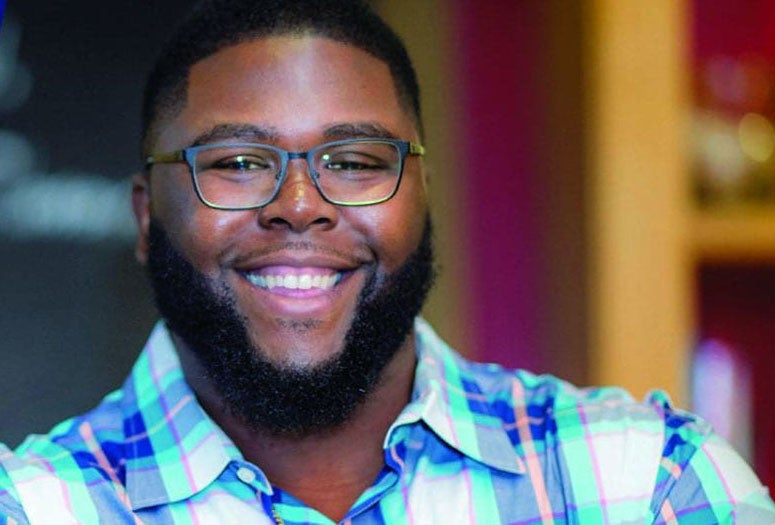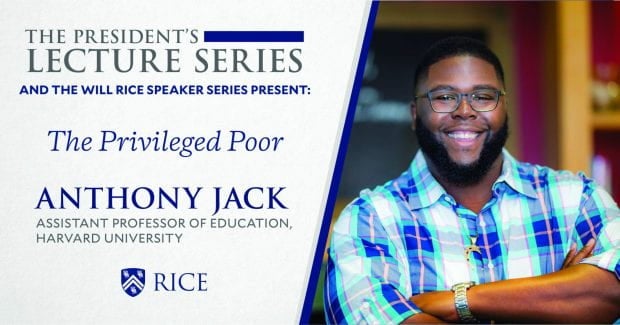How can colleges and universities more effectively improve diversity and inclusion on campus? First and foremost, scholar Anthony Jack said during a virtual lecture Jan. 28, they should do what he did: “Listen to your students.”
The Rice University President’s Lecture Series and the Will Rice Speaker Series brought Jack, a junior fellow at the Harvard Society of Fellows and assistant professor of education at the Harvard Graduate School of Education, back to “campus” for the well-attended online lecture — in 2015, as Jack noted, Dean of Undergraduates Bridget Gorman invited him for a job talk.
“I don't know if you know this but I cried when we got off the phone because I was so happy to be given that opportunity,” Jack said. “To be invited back in this capacity as part of the Presidential Lecture Series, it's truly an honor to be here and be part of the continued dialogue about access and inclusion, especially in the midst of these troubling times.”
Jack’s bestselling 2019 book “The Privileged Poor” examined the struggles of disadvantaged students at elite colleges and explained what schools can do differently to help them thrive. In 2016, he graduated with his Ph.D. from Harvard after receiving dual bachelor’s degrees in women’s and gender studies and religion from Amherst College.
His first ride in an airplane, Jack told the audience, was a recruiting trip to Amherst. The Florida native had earned a scholarship to Gulliver Preparatory in Miami, a “mobility springboard” that offered much greater access to colleges like Amherst than his troubled public high school would have. And in 2003, as a first-generation freshman attending an elite college, Jack continued to witness firsthand many of the issues he later reported on in “The Privileged Poor.”
What he found most striking about academia, however, was the monolithic way in which sociologists at the time wrote about first-generation and low-income college students, of little more than their “chronic culture shock” and “social isolation.” This narrative left little room for their individual experiences — which, he found among his peers, varied greatly.
A significant number of first-generation and low-income undergraduates in elite universities, for instance, came from the same eight boarding schools in the Northeast that had long served as a feeder for the Ivy League. These “privileged” students had been better acclimated to college by their preparatory academies, to which they had often received financial aid or scholarships, but they still shared similar struggles with their fellow first-generation students from traditional public high schools.
These “privileged poor” students, Jack observed, were greatly understudied — especially as an increasing number of elite colleges were broadening access with generous financial aid packages of their own. Universities that were simply celebrating their increasing diversity statistics, he said, were doing themselves and their students a disservice by failing to understand or adequately prepare for them.
“Uncritically praising universities as democratic institutions for increasing access reflects a limited civic imagination,” Jack said. “An admission letter and generous financial aid do not a diverse college make; access ain’t inclusion.”
To write “The Privileged Poor,” Jack sat down with over 100 first-generation and low-income students from an array of backgrounds, all of whom were attending a world-renowned, predominantly white institution in the Northeast. His two years of ethnographic observations sought to answer a simple question: What is it like to be a student here right now?
“We seem to have forgotten an old truth that citizenship is so much more than just being in a place — it’s about accessing all the rights and privileges pertaining thereto,” Jack said. “This is what I studied. This is what I lived.”
Hidden or unwritten rules, for instance, serve as a huge barrier for those unfamiliar with a college's atmosphere and expectations. Many first-generation students were often uncomfortable approaching professors, coming from environments where “keeping your head down” was more valued than speaking up or asking questions. “Office hours” needed to be explained as a concept; the value of creating a relationship with a professor was not a given. As such, these students were less likely to benefit than those who interact more with faculty — less likely to receive recommendation letters, awards, internships and access to other mobility springboards.
Low-income students also deal with challenges at home that many universities simply fail to acknowledge, such as navigating holiday breaks — much-anticipated vacations for wealthier students, but “the real ‘Hunger Games’” for others, Jack said.
“Spring break means something totally different to low-income students,” Jack said.
Of the nearly 80 colleges that have adopted no-loan financial aid policies, only 20% keep their dining halls open during spring break. When other college serveries and cafeterias close for that week, he said, 1 in 7 students on these elite campuses end up fending for themselves.
“I want you to think about that for a second: At one of the world's wealthiest institutions, with a multibillion-dollar endowment, 1 out of every 7 students marked hungry days on their calendar, without fail,” Jack said. “There’s always famine during spring break.”
This is just one manifestation of food insecurity among undergraduates, a common issue that caused one young undergrad to ask Jack: “How can you support yourself when you can’t even feed yourself?”
These are not individual failings, Jack noted. Examining where students come from and how their backgrounds affect their success in college is vital, but so is examining the larger framework already in place.
“I want to move the conversation away from individual differences — where we simply compare those whose parents went to college and those whose parents did not — to focus on how structural inequalities like segregation, poverty and disinvestment in public K-through-12 education manifest themselves on campuses,” Jack said.
“My investigation into this diversity among lower-income youth pushes back against the dangerous downplaying of how prolonged exposure to savage inequality in our neighborhoods and in our schools affects how students navigate college, if they make it there at all,” he added.
Colleges, he said, should also observe which of their first-generation students immerse themselves in their campus community and which view it instead as a toxic or unsupportive environment. Digging into the roots of those differences forces universities to think about how their policies and practices facilitate or hinder students’ success.
“To overlook this rich diversity of experiences within the first-generation college student community is then to base policy on only a partial picture,” Jack said. “We must work to ensure that students don't just graduate, but do so whole and healthy and ready for the next adventure.”
Before taking questions from the audience, Jack finished his lecture with a direct challenge to Rice students themselves: demand as much of the university as it demands from you.
“When James Baldwin reflected on America, his home, he noted: ‘I love America more than any other country in this world, and, exactly for this reason, I insist on the right to criticize her perpetually,’’ Jack said. “Remember that your college is your home. You are its citizenry. Make your voices heard.”


